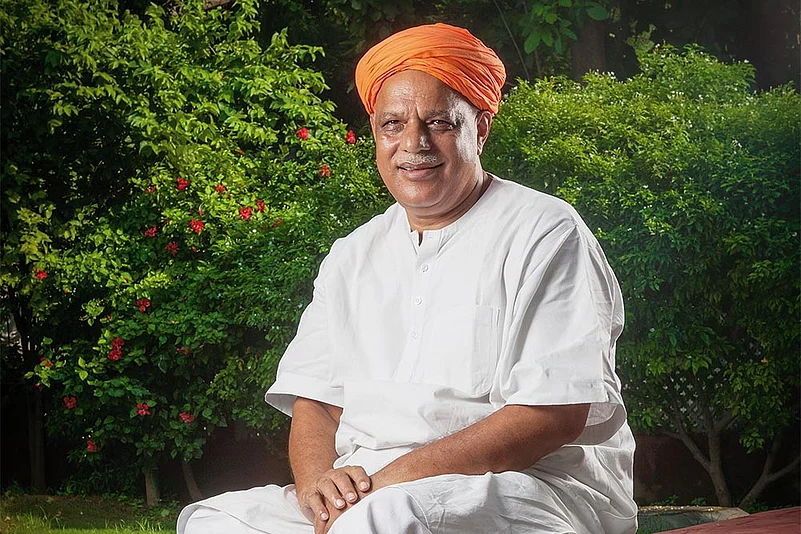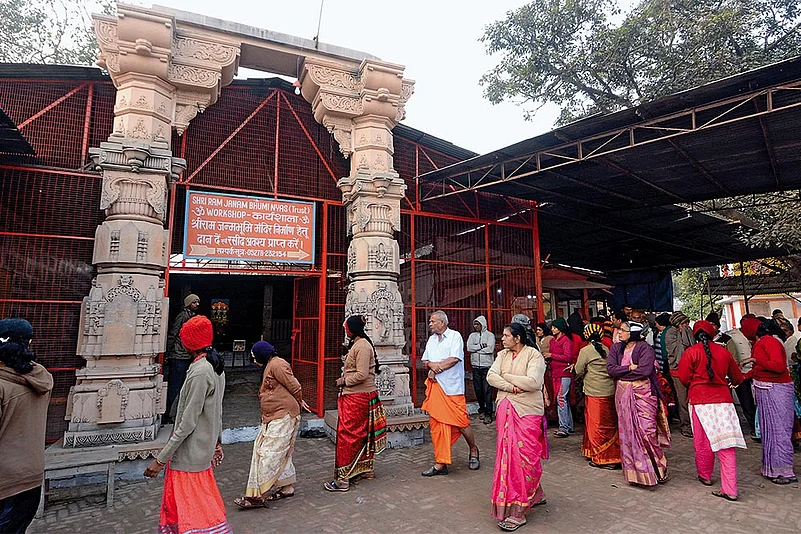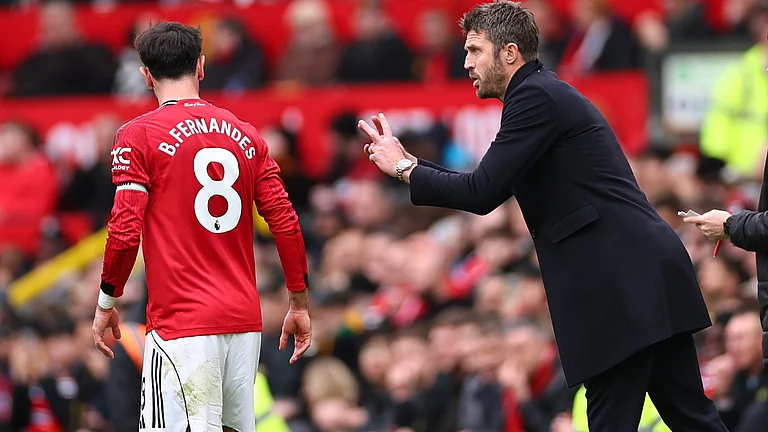The fabled battlefields of history are mostly to the northwest, or elsewhere. But post-independence, these vast Gangetic plains have hosted the decisive contests. To that extent, with just the latter part of winter left before Uttar Pradesh votes—an event whose significance will go way beyond the fact of a new government being elected—it’s surprising that no election banners or posters have appeared in its town streets. A few old Diwali buntings or New Year fliers flutter in the cold air. Like a deathly calm before the storm, perhaps. The only consensus: the playing field is a triangle of shifting proportions. Akhilesh Yadav, rather than the Samajwadi Party, will be trying to hold out against the BJP and the Bahujan Samaj Party, and the odds lengthen or otherwise unpredictably.
UP’s aam admi relates more to Akhilesh than his party (just the way most Indian voters today relate more to Narendra Modi than necessarily to the BJP) and he seems to have survived the fratricidal bouts in the family more than intact. Mayawati’s rallies have been impressive, but few speak of her or the BSP unless it’s a Dalit-dominated area. Behenji’s politics too has been waged in a hidden way. The Congress, for all the premature lather it worked up thanks to its strategist Prashant Kishor, now seems to have waned from the radar without any credible faces. The one chance of visibility it has is if a late alliance with the SP works out, or if the demonetisation debate gives it some play. Otherwise, Akhilesh’s development plank may set the agenda.
On the Allahabad-Varanasi highway, over 30 newly-bought black Boleros in the service of ‘Dial 100’ and ‘UP 100 UP’ whiz by at high speed, trailing a cloud of dust. It’s a popular people’s project for quick anti-crime response, conceived by Akhilesh. He has been working hard for a year, clearing Metro lines, infrastructure projects, innumerable Innovas and Boleros for Dial 100 in big districts like Lucknow, Varanasi, Kanpur and Allahabad, a women’s power line (‘Dial 1090’) and a pension scheme for women. Then, there’s Dial 108, also known as ‘Samajwadi 108’, for ambulance; it’s a huge success in villages. Besides, there are dialyses done with minimum charges.
Yes, the SP still carries the goondagardi stigma. Only in mid-December, Atiq Ahmed, mafia head-turned-politician and candidate from Kanpur Cantonment, was seen on CCTV leading goons to an institute in Allahabad’s Naini, where the staff had tried to thwart malpractices. SP supremo Mulayam Singh Yadav has also spoken of partymen involved in land-grabbing, and being least bothered about the party’s reputation. All the periodic muscle-flexing by partymen did dent Akhilesh’s image. Demonetisation has slightly helped the CM. Debate on the note-ban has gained more volume over Samajwadi style anarchy.
As for the family feud, Akhilesh’s back-to-the-wall battle with ‘chacha’ Shivpal and ‘uncle’ Amar Singh actually gained him people’s sympathy and burnished his clean image. Many in the power corridors still whisper of a likely split in the party but it may be too premature in terms of the bigger political canvas at the moment. The uneasy balance of terror between the BSP, SP and BJP may yet decide how internal events in the SP play out. As of now, Akhilesh goes about as usual, taking his wife Dimple to most of his programmes such as vikas yatras. She has also been attending most project inauguration functions.
What has helped Akhilesh in the face of what should have been near-insurmountable odds has been the fact that he is able to relate to the youth, who are an ambitious lot. His schemes of distributing laptops and tablets, besides now a promise of smartphones if brought back, goes down well in new Uttar Pradesh. Many complain that the party’s young cadres are the primary beneficiaries of the freebies, but a message goes out to the student fraternity that the CM wants to work for them. Akhilesh in general is also considered a far better politician in the province where senior SP leaders, traditionally, have patronised those with dubious antecedents.
Satyadeo Tripathi of the Congress, who was with Mulayam for 14 years in Janata Party, has a different take. “I don’t feel SP is samajwadi. They are casteist. There is no difference between father and son,” notes the 72-year-old. “I am from Auraiya (carved out of Etawah) and have seen the family from close quarters. Mulayam is a ‘jatibadi neta’ with the label of a socialist.”
Akhilesh is also charged with neglecting the education sector in reality. Cheating in exam halls is common. A ‘Yadav mafia’ allegedly controls the sector, grabbing contracts for holding exams, and extracting money to help candidates pass. Civil rights activist Tarique Shafiq of Sanjarpur says textbooks from the government are yet to reach the schools in Azamgarh’s primary class. “This, when the half-yearly exams are over,” he points out. Jobs, too, smack of social bias. Many complain that Yadavs are favoured in appointments in the police departments.
The BJP plans to make anti-incumbency a big factor in the elections. It’s another matter the party is yet to highlight a big issue or put up a credible face. The party’s last big local face was Kalyan Singh. Today, the BJP is trying to utilise the OBC support base of Anupriya Patel’s Apna Dal and also rebel BSP leader Om Prakash Rajbhar’s Suheldev Bharatiya Samaj Party in eastern UP. So far, the leadership hasn’t touched upon the Ram mandir issue that is pending in the Supreme Court. At the same time, the party is sanguine over one thing: voters seem to favour the PM-announced demonetisation despite attendant hardships. Many are impressed with Modi’s claim of a ‘surgical strike’ on black money that, they feel, the urban rich “stocked at the expense” of the rural poor. If in the rural belt, people express faith that Modi will be able to prove what he stated, it can also be seen as the poor feeling pleased that their leaders/superiors are getting caned now.
“A big boil necessitates surgery; it will pain,” says Sudhir Kishore, a Kurmi in Balsingh Khera village of Mohanlalganj (SC) constituency in Lucknow district. Clearly, not all Dalits support Mayawati. The BJP’s social engineering aims to broaden its profile from its old image as a bania party. It’s getting the favour of many Dalits—such as Pasis, Dhobis, Khateeks and Balmikis.

Is he the Thakur face of the BJP in UP ahead of the polls?
Even so, local BJP leaders have alerted the top brass that post-demonetisation blues would have to end in two months for the party to be effective in the poll race. “With 71 MPs from UP, the party should win at least 71 assembly seats,” a senior leader said, indicating diffidence in the BJP. It is to be seen how much of the ‘Modi magic’ will repeat in the state two-and-a-half years after it did at the national level.
Earlier, the business classes were the known BJP supporters. Post-demonetisation, the Vaishya community of small-time traders feel they have been stabbed in the back with a dearth of liquid cash. The note-ban, they feel, could have been implemented in a phased manner. In Rae Bareli, entrepreneur Trilochan Singh told Outlook that demonetisation led to the cancellation of six events in his hotel recently.
In Faizabad, Ashok Pandey has a shop selling mainly sarees. For a fortnight that followed demonetisation, the wholesaler got no customer. Even the towels, bedsheets and lungis he’d typically bring from Tanda and Akbarpur stopped coming. For, the weavers didn’t have money to buy threads; the wholesalers had no cash to pay either. The vicious cycle continued for a month. In Varanasi’s Pili Kothi, weavers are going through a challenging time. Most of its nearly 3,500 looms, big and small, are shut. Some have sent the children out to look for work elsewhere. To recover from the political damage, the BJP is now giving the spin, which has reached the grassroot, that bankers and hoarders have played mischief.
Muslims are a sizeable community in the state. The BJP appears to be hinging more on fragmentation of this votebank in as many compartments as possible. A section of the Muslims, who are annoyed with the SP over the party’s ‘failure’ to keep its 2012 election promises made to the community, are openly speaking in favour of a replacement. Azamgarh-based Shahid Badra Falahi, a former president of the outlawed SIMI, told Outlook that Muslims are “aggrieved” that the Akhilesh regime neither released from prison innocent Muslims nor acted against those who “falsely implicated” them. The promise of 18% reservation for Muslims in all spheres of life remains a mirage. “We are disappointed with the SP,” he says. “We want an alternative.”
Not all in the community are decided on the matter, according to a Varanasi-based observer. “Muslims are in a dilemma over whether to vote for the SP or switch over to the BSP. Like in earlier times, they will decide at the last moment,” he says. “The inculcated ‘minority’ status will work heavily in their mind: the new mentality that they are the ‘most undesirable’ Indians is surely going to be a factor.” The SP is also charged with not taking any action on the Nimesh Commission report that was tabled in the assembly in 2013. The panel had blown holes in the UP police’s theory of involvement of two Muslims (both deceased) in terror activities. The commission reportedly said that their involvement “appeared doubtful”. It was in 2008 the Mayawati government set up the commission, which submitted its report to the SP government in August 2012.
Masihuddin Sanjari of the Rehai Manch, which fights for youth ‘framed’ in terror cases, says the ruling SP was also “inactive” in the controversial Mohammad Akhlaq case also where a mob lynched a middle-aged Muslim in Dadri off Delhi 15 months ago for allegedly stocking beef. “The BSP, too, failed to encash the issue politically,” he adds. Sanjarpur Muslims are almost in full agreement that the SP won’t raise the Batla House encounter where two suspected terrorists in the national capital’s Jamia Nagar were killed in September 2008. In case Mayawati raises the issues, it would only give the BJP mileage to consolidate its vote-base, they add.
Undoubtedly there have been erosions in the SP, but Mayawati too has a dismal record on the Muslim front. Notwithstanding their disillusionment with the SP, a majority of Muslims feel Mulayam is better than Mayawati. They fear a BSP victory can prompt its leader to shake hands with the BJP. On the surface, both the SP and the BSP corner the BJP over issues like the Uniform Civil Code and triple talaq, attacking it for being ‘anti-Muslim’.
The Muslims of Charthawal assembly constituency offer intriguing affiliations: they laud Akhilesh’s ambulance scheme and also take care to appreciate the Modi government’s surgical strike against PoK-based militants across the LoC in Kashmir. One common complaint against the BSP is the usual one: that its leaders seldom come back to their constituency. Legislator Noor Saleem Rana of Charthawal “hasn’t once visited our village since the last election,” says Hasan Miya, 50, of Gafurpura mohalla under the assembly constituency in Muzaffarnagar district. “So is the case with former BSP MP Qadir Rana.” Muslims do realise that their voteshare splitting between the SP and BSP will help the BJP. And yet, the community’s electoral psychology doesn’t work the same way for assembly and general elections. A persecution complex since the 2002 Godhra riots of Gujarat continues to haunt them, even as they yearn for a better and normal life.
Strangely, the BSP bills in Nawbissa mohalla don’t sport the party’s elephant symbol. But insiders claim Mayawati’s votebase of Dalits and allied segments is still intact. The ex-CM is known for working silently with her cadres spread across the state. She believes national-level Dalit issues can still dent her political rivals. The attacks on Dalits by the gau rakshaks, for instance, or the suicide of the bright Hyderabad University scholar Rohith Vemula in January 2016. Dissident BSP leader R.K. Chaudhury counters these, though. “If Mayawati is so strong, then why has her party failed to find presence in the south India even after the Rohith Vemula case,” asks the leader, who heads the Bahujan Samaj Swabhiman Sangharsh Samiti.
By far, the BJP is seen as the best organised, with messages from top leaders being transmitted efficiently to the cadres. It’s a mechanism Akhilesh and his party lacks. The Congress is better set this time, but the workers are yet unsure whether the party would be in alliance with the SP. The Congress is waiting and watching in whose favour voters’ mood would swing, the SP or the BSP, while Akhilesh favours an alliance with the Congress to arrest the Muslim votebase from drifting to the BSP. A senior Congress leader in Lucknow, however said, it will be “sad” if there is an alliance. “The party leadership shouldn’t feel that it is their last election. But if there is an alliance, we will draw some common minimum programme and dilute some of the trickly issues. Sad, but that is the reality.”
A Varanasi-based analyst says Mayawati still holds a chunk of her Dalit votebase intact, though upper caste votes (which had shifted from the Congress to the BJP after the 1992 Ayodhya demolition) are partly in flux. Thus, he says, Kishor, the Congress’s ‘chanakya’, may still have some latitude to play with in terms of alliances. “If they go with the SP, the UP political scene will change,” he says, noting the Congress loss in 47 seats in the last election was with a margin of around 5,000 votes. For the GOP, the 2017 assembly poll is a short goal. The real target is the 2019 Lok Sabha polls.


























